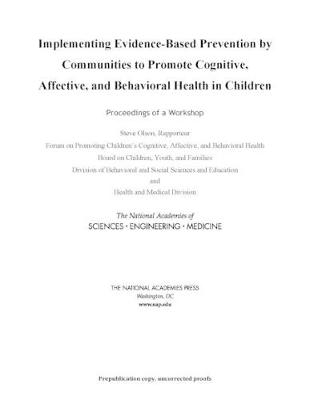
Implementing Evidence-Based Prevention by Communities to Promote Cognitive, Affective, and Behavioral Health in Children
Proceedings of a Workshop
Seiten
2017
National Academies Press (Verlag)
978-0-309-45647-0 (ISBN)
National Academies Press (Verlag)
978-0-309-45647-0 (ISBN)
Communities provide the context in which programs, principles, and policies are implemented. Their needs dictate the kinds of programs that community organizers and advocates, program developers and implementers, and researchers will bring to bear on a problem. Their characteristics help determine whether a program will succeed or fail. The detailed workings of programs cannot be separated from the communities in which they are embedded.
Communities also represent the front line in addressing many behavioral health conditions experienced by children, adolescents, young adults, and their families. Given the importance of communities in shaping the health and well being of young people, the National Academies of Sciences, Engineering, and Medicine held a workshop in June 2016, to examine the implementation of evidence- based prevention by communities. Participants examined questions related to scaling up, managing, and sustaining science in communities. This publication summarizes the presentations and discussions from the workshop.
Table of Contents
Front Matter
1 Introduction and Overview of the Workshop
2 Transporting Evidence-Based Preventive Interventions into Communities
3 Building Community Capacity for Choosing, Adapting, and Implementing Evidence-Based Programs
4 Taking Advantage of Cutting-Edge Methodologies
5 Programs or Principles?
6 How to Sustain Funding
7 Being Responsive to Communities
8 Reports from the Breakout Groups and Final Discussion
References
Appendix A: Workshop Statement of Task
Appendix B: Workshop Agenda
Appendix C: Biosketches of Workshop Speakers and Moderators
Communities also represent the front line in addressing many behavioral health conditions experienced by children, adolescents, young adults, and their families. Given the importance of communities in shaping the health and well being of young people, the National Academies of Sciences, Engineering, and Medicine held a workshop in June 2016, to examine the implementation of evidence- based prevention by communities. Participants examined questions related to scaling up, managing, and sustaining science in communities. This publication summarizes the presentations and discussions from the workshop.
Table of Contents
Front Matter
1 Introduction and Overview of the Workshop
2 Transporting Evidence-Based Preventive Interventions into Communities
3 Building Community Capacity for Choosing, Adapting, and Implementing Evidence-Based Programs
4 Taking Advantage of Cutting-Edge Methodologies
5 Programs or Principles?
6 How to Sustain Funding
7 Being Responsive to Communities
8 Reports from the Breakout Groups and Final Discussion
References
Appendix A: Workshop Statement of Task
Appendix B: Workshop Agenda
Appendix C: Biosketches of Workshop Speakers and Moderators
1 Front Matter; 2 1 Introduction and Overview of the Workshop; 3 2 Transporting Evidence-Based Preventive Interventions into Communities; 4 3 Building Community Capacity for Choosing, Adapting, and Implementing Evidence-Based Programs; 5 4 Taking Advantage of Cutting-Edge Methodologies; 6 5 Programs or Principles?; 7 6 How to Sustain Funding; 8 7 Being Responsive to Communities; 9 8 Reports from the Breakout Groups and Final Discussion; 10 References; 11 Appendix A Workshop Statement of Task; 12 Appendix B Workshop Agenda; 13 Appendix C Biographies of Workshop Speakers and Moderators
| Erscheinungsdatum | 28.09.2017 |
|---|---|
| Verlagsort | Washington |
| Sprache | englisch |
| Maße | 152 x 229 mm |
| Themenwelt | Medizin / Pharmazie ► Medizinische Fachgebiete ► Pädiatrie |
| Sozialwissenschaften ► Soziologie ► Mikrosoziologie | |
| ISBN-10 | 0-309-45647-9 / 0309456479 |
| ISBN-13 | 978-0-309-45647-0 / 9780309456470 |
| Zustand | Neuware |
| Haben Sie eine Frage zum Produkt? |
Mehr entdecken
aus dem Bereich
aus dem Bereich
Inklusive Neonatologie/ Intensivmedizin
Buch | Softcover (2020)
Urban & Fischer in Elsevier (Verlag)
30,00 €
Grundlagen, Klinik und Praxis
Buch | Hardcover (2023)
Urban & Fischer in Elsevier (Verlag)
129,00 €


